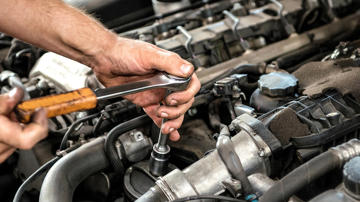Regular servicing is an important part of car ownership. As a general rule of thumb, a regular service should happen every 6 months or 10,000kms (whichever comes first). But sometimes an issue comes up unexpectedly with your vehicle.
It’s easy to know your car needs some attention when your engine is blowing smoke. But what about some of the less obvious signs? We’ve pulled together six of them that signal your car is need of a service.
1. Mystery noises
When a car is running well, all its sounds should be pretty familiar. Some of these may not be pleasant – that thud you hear if you drive over a pothole is never a nice sound – but normally you should only hear your engine, your air conditioning, and your car radio.
Hearing anything else can be a sign something is going wrong with your car. So if you notice any mystery noises, whether it's a rattle, a ticking sound, a thud, or something similar, it’s a sign that it's time for a service.
Remember, even if you think the noise may not be an issue, it's important to keep in mind how loud a car engine can be. So if you’re able to hear a noise over the engine while you're driving, it's fairly likely a real issue is crying out for some attention from your mechanic.
2. Warning lights
When it comes to warning lights, there are often two types of approaches taken. The first approach sees a driver making a beeline for their mechanic’s garage as soon as a warning light comes on. The second type is more casual, the classic ‘she’ll be right, mate’ attitude.
It may be surprising to know that the second approach is not always a bad one. In many cars, a warning light (or multiple warning lights) will often stay on for a moment when the car first starts up. To new drivers – or to someone who just bought a new car – this can be a bit unsettling. And sometimes warning lights flash or stay on due to a malfunction with the light, not the car itself.
But if a warning light comes on and stays on, it's definitely a good idea to get it checked out.
3. Bad brakes
Your brakes should always be sharp and responsive. In many ways, they're the most important component of your vehicle, which is why car manufacturers put a whole lot of time and money into ensuring they work correctly and consistently.
Obviously if they don't, it can be an immediate safety issue. So there’s no reason your brakes shouldn’t remain good from service to service. If they're nearing the end of their life and need replacement, your mechanic will surely mention it.
So if you find your brakes going bad for any reason, it's crucial to get them checked out fast.
If you have any doubts about the safety of driving your car to your mechanic's garage, it's best to give them a call and ask if they can visit you for an inspection, or have your car towed there instead.
4. Weak starts
Your car may not be an F1 racer on pole position, but it should still have a crisp and strong start.
This applies whether you have a big roaring V8 sports car or a more modest commuter sedan.
Every time you turn the key, the engine should come to life quickly and then settle into a steady hum before you drive off. Any shift away from this type of start is likely to be a problem. This is especially important if you notice the issue persists, or the decline in start time continues over a longer period.
It’s true some allowance should be given for seasonal conditions – a cold winter morning may see the car start a little slower than a hot summer’s afternoon – but overall it should be quick and punchy every time you turn the key. If it’s not, get a service.
5. Sluggish gear changes
Gear changes can slow down a little from service to service. Just as your car should feel like new after a good service with a really smooth transmission, when it's almost time for your next service, it may not be as responsive.
But this decline should be minor, and really something you're unlikely to notice. That’s why any sharp drop in performance that sees your transmission become sluggish quickly isn’t normal. There can be many reasons this happens, but when it does, it’s never a good sign.
Just like poor starts, some environmental factors need to be taken into account here. If your gear changes are just a tiny bit slower when leaving your driveway in the morning, it's likely just your car shaking off the winter chill. But if it persists – or if your transmission randomly stalls and becomes sluggish during your drives – that's a clear sign something is wrong.
6. Power loss
Any power loss at all could be a big problem. Not only because it can make the car inconsistent when it starts – and nobody wants to get stuck in the carpark at work on the way home – but more importantly because it could quickly become a real safety issue.
Finding you’ve lost power when parked is annoying, but losing power while driving can be a hazard to you and other drivers.
Good car maintenance and servicing is not just about an occasional visit to the mechanic, but about keeping an eye out for any issues that may arise as well. It’s no secret that taking your car to the shop and getting it looked at can be a bit of a pain, but it’s always best to be proactive. Given that there are over 52,000 auto businesses in Australia, there’s no shortage of great mechanics around.
But how do you pick the right one? And how do you know you’re getting good value from your choice? Autoguru is a brand new service that helps you save on car servicing. AutoGuru lets you choose from a list of reputable repairers, view real customer reviews online and book it all straight away.



